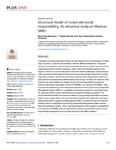Mostrar o rexistro simple do ítem
Structural model of corporate social responsibility. An empirical study on Mexican SMEs
| dc.contributor.author | Ríos-Manríquez, Martha | |
| dc.contributor.author | Ferrer-Ríos, Martha Gabriela | |
| dc.contributor.author | Sánchez-Fernández, María Dolores | |
| dc.date.accessioned | 2021-04-13T10:16:31Z | |
| dc.date.available | 2021-04-13T10:16:31Z | |
| dc.date.issued | 2021 | |
| dc.identifier.citation | Ríos-Manríquez M, Ferrer-Ríoss MG, Sánchez-Fernández MD (2021) Structural model of corporate social responsibility. An empirical study on Mexican SMEs. PLoS ONE 16(2): e0246384. https://doi.org/10.1371/journal.pone.0246384 | es_ES |
| dc.identifier.issn | 1932-6203 | |
| dc.identifier.uri | http://hdl.handle.net/2183/27727 | |
| dc.description.abstract | [Abstract] Companies are increasingly aware of their role with regard to social responsibility in its three pillars: economic, social and environmental, with their different stakeholders. Facing the dilemma of choosing the model of social responsibility they should adopt, taking care of their organizational culture and their employees, with a global vision that the business world requires. However, it is not an easy task for small and medium enterprises, mainly because of their economic shortcomings in human resources and knowledge of how to be a socially responsible company. But they are aware that Corporate Social Responsibility (CSR) is an opportunity for development and differentiation in the market. Therefore, the objective of this research is to build, identify and validate a model of Social Responsibility in small and medium enterprises in Guanajuato, Mexico (CSRSMEs), on a sample of 226 SMEs, using as a basis the methodology of the international standard of Ethical and Socially Responsible Management System (SGE21). A quantitative approach was used and, a descriptive analysis, exploratory factor analysis and the structural equation modeling was applied. The results determine that the most relevant variables for being socially responsible are human capital, clients, supply chain, social environment and impact on the community, and organizational governance: Legality and Management System. It is drawn from this work that the flexibility of the so-called Ethical and Socially Responsible Management System has the empirical foundations needed. That is, from the perspective of the company’s management to consider the CSRSMEs model an opportunity to adopt and evaluate the areas of social responsibility management of any business structure in the SMEs in Mexico. | es_ES |
| dc.language.iso | eng | es_ES |
| dc.publisher | ManMohan S. Sodhi, City, University of London, UNITED KINGDOM | es_ES |
| dc.relation.uri | 10.1371/journal.pone.0246384 | es_ES |
| dc.rights | Atribución 4.0 Internacional | es_ES |
| dc.rights.uri | http://creativecommons.org/licenses/by/4.0/ | * |
| dc.title | Structural model of corporate social responsibility. An empirical study on Mexican SMEs | es_ES |
| dc.type | info:eu-repo/semantics/article | es_ES |
| dc.rights.access | info:eu-repo/semantics/openAccess | es_ES |
| UDC.journalTitle | PLoS ONE | es_ES |
| UDC.volume | 16 | es_ES |
| UDC.issue | 2 | es_ES |
Ficheiros no ítem
Este ítem aparece na(s) seguinte(s) colección(s)
-
GI-GREFIN - Artigos [71]






